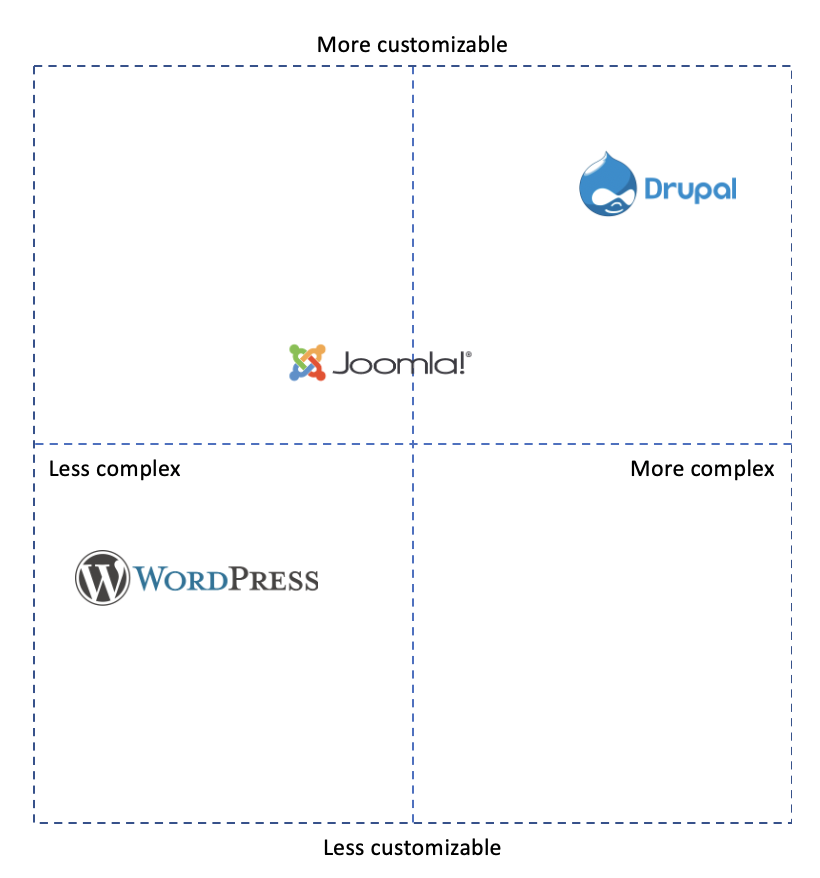Why Drupal? Why Drupalera?

With a number of increasing alternatives for web technologies to use as a base for a corporation’s web ecosystem, it is becoming more and more difficult to choose “the right one”. Among other reasons, once a technology has been adopted and the current web ecosystem has been migrated, it becomes very expensive to migrate it to a different technology.
So the question comes: what is the best web technology for me? Is it Drupal?
The best answer we can provide is the typical MBA one: well, it depends…
There is no one-size-fits-all web technology that serves all kinds of purposes, sizes, etc. Obviously there are a number of variables that could affect the decision, although not all of them are equally relevant.
We will quickly go through the ones we believe are more important: license openness, customizability and security.
License openness
We can categorise web technologies into two broad groups: proprietary vs open-source. The main differences are about how much (if anything at all) can the user of the technology modify it or she has to rely on the vendor for modifications.
Although there are generally pros and cons for each license type, when it comes to choosing the technology a company will use as the main online channels to interact with their customers, we strongly recommend to choose open-source solutions. This way, a better control over the technology can be exercised while keeping a much lower lock-in effect with the technology partner or vendor. If over time the chosen web technology supplier(s) doesn’t perform, the license doesn’t prevent them from choosing a new vendor. This has a positive side effect: there is a higher incentive for suppliers to perform, because only a good performance with open-source technology will guarantee a long-term successful relationship with the given supplier.
Customizability
This is a key element in many situations when choosing a long-term web technology: how much will I be able to adapt it precisely to what I need? And what about scalability? Will it meet my needs when I grow over time?
How important it is strongly depends on how big and complex the web ecosystem is (or will be), how many third-party systems it must integrate with, how many specific features are required, and a long etcetera.
There is a rule of thumb here: the more customisable, the more complex. This happens almost by definition.
In the chart below, there is a summary for several well-known open-source web technologies in a very simple framework that considers customizability vs complexity:

Wordpress is probably the easiest to use. This is the main reason why it is the most widely used open-source Content Management System in the world. It is highly recommended for smaller non-complex websites with no particularly demanding needs for customisation or third-party integrations.
The strengths of Drupal are different. It is a highly versatile CMS that is able to be customised for any use and integrated in any environment. Its high customizability and flexibility comes at the expense of a higher difficulty to set up and adapt. It is highly recommended for more complex environments where a customised solution is needed, tailored to specific requirements. The scalability to large sites is what sets Drupal apart from the other two offerings.
Security
Open-source solutions are arguably safer alternatives to proprietary ones, where only the vendor can fix a specific security issue.
Among the most used open-source alternatives, there is a varying degree of security strength.
Looking at WordPress, their security team is made up of 25 experts, including lead developers and security researchers. This number seems very low, given that the number of sites running off WordPress is around 75 million. The major security vulnerability with WordPress, and most CMS, is the entry points created using third party plug-ins and extensions, which make up for 56% of known vulnerabilities in WP.
Regarding Joomla!, even though its core is highly secure, there are pitfalls users can fall into when implementing their system without appropriately configuring all system components. Documentation made readily available by Joomla encourages users to focus on what they can do to improve their system security, as opposed to just relying on the system itself. It is worth noting that Joomla has the least amount of individuals on their security team with just 13 people, but provides solid information to individuals using their services to configure security in the appropriate way.
Drupal is considered to be the most secure of the big three. The Drupal community is very serious about security and has a dedicated all-volunteer group of 40 individuals, who work to improve and maintain the security of the Drupal project. The list of Drupal sites used for state, provincial and national governments is the perfect indication that the system is highly secure. Government sites including the White House, House of Representatives and all U.S. government departments, including NASA, use Drupal.
Why Drupal?
So, back to the original question, we would like to rephrase it to: WHEN Drupal? Our answer would be: when customizability, scalability and security are important factors for the web ecosystem one is aiming to build.
Why Drupalera?
We at Drupalera, want to become a well-known international Drupal and Innovation reference center. For that reason, since 10+ years we have committed to 3 key elements:
- Execution excellence: Drupalera is constantly pursuing best methodology practices which we tailor specifically for Drupal.
- Customer focus: From Drupalera we provide peace of mind for our customers and ROI for their businesses by taking care of the Drupal idiosyncrasy.
- Specialised knowledge: Drupalera promotes a Drupal culture in Emergya which results in better, faster, and more efficient solutions to our clients.
These 3 elements are positively improving each other following what we call the Drupalera virtuous cycle.
This is probably the reason why: 1) big names such as Nestlé, Verisure or Turner have chosen us as a preferred Drupal partner, 2) we have a portfolio of 30+ current Drupal-related collaborations and 3) the past 3 years Drupal business pipeline has exceeded USD 5m.
Either if you are already on Drupal and want to bring into your team a reliable knowledgeable Drupal provider or if you are thinking of moving your current web platform to Drupal, we can support you.
We know Drupal, we are passionate about it and we really want to help you to make the most out of your business with Drupal. Shall we?




